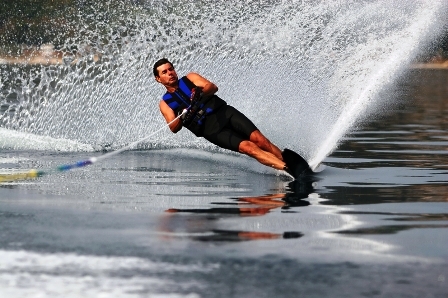Summer and Swimming Hazards for Contact Lens Wearers
Summer is upon us once more and, even if the sun is playing hard to get (or at least hard to keep), many of us will be itching to get out there and have some fun with some hot weather antics. Whether you’re lucky enough to get a few days – or even a few weeks – of sun in the UK this Summer or you’re planning to jet off to a place where you’re guaranteed at least that much, it’s likely you’ll soon be looking for a way to cool off.
From diving competitions in the pool to dipping your toes in the freezing seawater, water offers us a much-needed break from the burning sun. But it can also be a lot of fun, too. Maybe you’re one for a laid-back breaststroke, you prefer to go snorkelling or diving, or just maybe water sports are your weakness in the summer months. Either way, it’s important to remember that some people need to be more careful than others.
All the activities we’ve mentioned thus far are undoubtedly a lot of fun for everyone. And for those of us lucky to have good eyesight or to have had Laser Eye Surgery, they are usually carefree pastimes. But for those still wrestling with glasses and fiddly contact lenses, these summertime activities can be fraught with concerns.
What’s the problem with glasses and contacts?
You might think that wearing glasses and contact lenses by the pool or at the beach is no big deal – but let’s take a look at the bigger picture. Imagine having to choose between risking the loss of your glasses on the banana boat or heading into the ocean, strapped to a speed boat with little view of what’s happening around you!
This type of scenario is one that our very own surgeon, Mr Glenn Carp knows all too well. Prior to having his short-sightedness corrected by Professor Reinstein in 2004, Dan was glued to his glasses.
“Before I had my surgery I used goggles with special lenses for swimming and I also had lenses fitted to my mask for scuba diving.”
But, even these aids provided a far from satisfactory solution.
“When I was sprint training, the goggles would fill with water and I could never see the time or second hand on the swimming pool clock. I had to have a small clock at the end of my swimming lane so that I could time the 15 to 20-second breaks between sprints.
It was also difficult to see properly when walking across the beach before scuba diving… it would have looked odd to have worn the mask!”
“Well,” you might be thinking, “that does sound quite annoying, but why didn’t he just wear contact lenses?”
The answer is simple: Contact lenses and swimming really do not mix. In fact, the consequences of wearing contact lenses while swimming or taking part in any of the other fun activities we’ve mentioned in this article can be downright dangerous.
The risks of mixing contact lenses and swimming
Wearing contact lenses during any water-based activities puts you at an increased risk of picking up an eye infection. The worst culprit is a tiny, one-celled, water-living bug called Acanthamoeba. This naturally occurring amoeba is found in water sources such as swimming pools, hot tubs, and even tap water!
They are incredibly resistant and can even survive in chlorine and boiling water. Yet, if these parasites infect the eye, they can cause a potentially serious condition called Acanthamoeba keratitis.
Mr Carp explains in more detail: “Although the cornea is very robust, if it has a tiny abrasion or break in the surface, these little bugs can get in. Treatment is very difficult and it can take years – if ever – for the cornea to repair itself. In extreme cases, it might even require a corneal graft or transplant. Contact lens wearers are especially susceptible.”
Bacterial infections, although treatable with antibiotics, can also be a risky side effect of wearing contact lenses.
“The lenses themselves are non-organic” explains Glenn “and bugs can stick to their surface causing eye infections, especially during extended use. This can affect the health of the epithelium (which forms the layer over the cornea). Daily use, disposable, contact lenses are the healthiest option.”
Still, when it comes to swimming and water sports, contact lenses should be avoided wherever possible. Wearing tight-fitting goggles can help to prevent water from getting to your eyes, but contact lens wearers are still at a higher risk of acquiring an infection.
Of course, there is a solution to this issue (and many others): Laser Eye Surgery. You could correct your refractive error for good and wave “goodbye” to your contact lenses and glasses. So, what are you waiting for?
To learn more about Laser Eye Surgery at London Vision Clinic, get in touch with one of our friendly clinic coordinators or Book a Consultation today.



